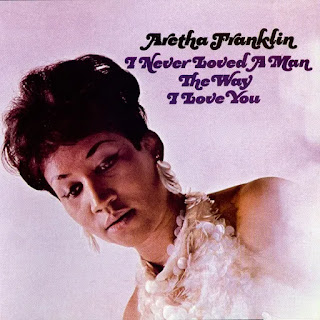13. Aretha Franklin, ‘I Never Loved a Man the Way I Love You"
This is wild, but no one really knows who wrote the original version of "Respect," a song each and every one of you know, the first song on this record. Originally presented to Otis Redding by Speedo Sims, Redding took the slow ballad, sped it up, and recorded it for his third album, Otis Blue/Otis Redding Sings Soul. But there's a reason you don't know that version and do know this one. Franklin rearranged the song, flipped the genders, and turned it into an anthem of female empowerment and one of the best-known songs in soul. In 2021, it came in first in Rolling Stone's Top 500 Songs list, and that's hard to argue with.
This compact, 32-minute album, Franklin's first for Atlantic, was her first top 10 album in the US and her first truly successful breakthrough album. Recorded partly in Muscle Shoals (a tiny Alabama town that is one of the truly most important spots in American music) and partly in New York, it arrived at a propitious time in early 1967, when second-wave feminism was just getting started and Franklin's declaration of independence and solidarity with other women found a ready audience.
It's mostly pure soul, with some obvious jazz influences (after all, Franklin had just recorded extensively as a jazz singer). What really comes through is the exuberance, a real joy, not just in a song like "Respect," but some of the lesser-known songs. "Don't Let Me Lose This Dream" for example, has a calypso lilt and a joyful plea not to let her down. "Dr. Feelgood" is a bluesy reverie that celebrates not the good doctor who will dispense medications, but the man who makes that guy unnecessary:
Fillin' me up with all of those pills
I got me a man named Doctor Feelgood
And oh, yeah, that man takes care of all of my pains and my ills
His name is Doctor Feelgood in the morning
And takin' care of business is really this man's game
And after one visit to Dr. Feelgood
You'll understand why Feelgood is his name
It's not exactly explicit, but the idea of a woman claiming her own sexuality at the time was still daring and unusual. Franklin cowrote much of the album with Ted White, and left her mark as a songwriter just as much as a singer.
The album is, of course, a monumental achievement and super-important, but, alas, is just not one of my favorites. To me, it sounds dated and not really that interesting. Just being honest here! There are gonna be some big misses for me in the Top 20. My job is to be honest about them.
Is this album in my personal Top 100? Nope.




Comments
Post a Comment